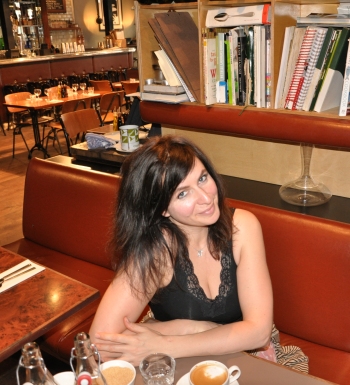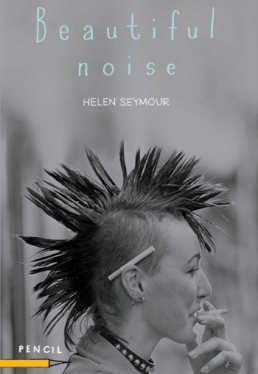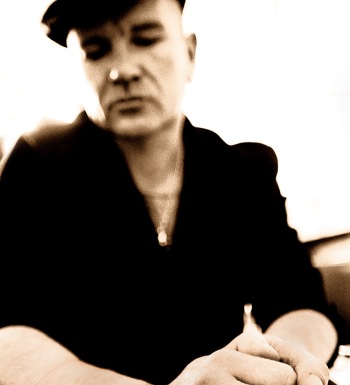HELEN Seymour gave up a lucrative role in advertising to become a part-time waitress and begin writing.
She tells Philip Cummins about turning down Harper Collins and asking Bono to launch her self-published debut novel.
"I can tell you that this is a single press: you can actually have a double press where you get like a little flat spine going along it; I can tell you it’s silk coated on both sides so that the photograph on the inside of the back is just a little bit shiny.
"I can tell you a lot about that, and for a lot of people that would be scary, but for me it’s just advertising. So printing the book and publishing it didn’t scare me.”
Helen Seymour is a pro. Though she rejects the perception of herself as a ‘Celtic Tiger high-flyer’ (“That expression in itself is kind of bizarre”), when I meet the former advertiser, marketer and now first-time novelist, she exudes the sort of confidence synonymous with those atop the crest of Ireland’s wave a decade ago.
Striding impressively across the upstairs foyer of Dublin’s Westbury hotel, the 44-year-old arches her pink tinted Chanel sunglasses atop her head as she gestures towards me and greets me with a confident display of cordial pleasantries. She’s clearly used to meeting fellow business professionals following 17 years at the coalface of marketing and advertising.
She leads the way as we find a table at which to seat ourselves. “Hmm... ,” she says. “Too near the aisle. What about the window... that sun is strong... .”
Seymour, a self-described “control freak” who used to run her own company, eventually settles on a table, seating herself on a couch and strategically placing herself within clear view of the outside clock of a pub down on the street, before ordering a double espresso.
For the next two hours she’ll prove engaging company as she discusses her bold move to follow her dream and jack-in her highly successful (and lucrative) day job in order to write her debut novel. Along the route she’ll touch on her friendship with Bono, the influence Ireland’s pirate radio stations of the ‘80s had on her, and turning down an offer from renowned publishers, Harper Collins.
Her novel, Beautiful Noise, a story of three young Dubliners who set up a pirate radio station called Studio One that takes on RTÉ, has been lauded by everyone from Roddy Doyle to Bono. The U2 frontman even launched the work in the full glare of the national media last February; unheard of, for a self-published writer.
Writing about a pirate radio station in 1980s Dublin, she says, came by default rather than design.
“I grew up in an era of no mobile phones, no internet,” Seymour says. “You had two television stations, five if you were lucky.” Wide-eyed with wonder, she recalls how she first discovered pirate radio stations such as Big D and Radio Dublin, a breathing ground for future RTÉ talent such as Dave Fanning and the late Gerry Ryan. She was struck, she claims, by the alternative ways of thinking and the non-mainstream culture that pirate radio fed on.
“I was always going to be a writer, I think, though I didn’t know that back then,” she says. “But writing was always what I wanted to do; it was at the heart of who I was. So worlds interested me and there were all these fascinating little worlds. And I used to just sit there, night after night, going up and down the dial.”
In fact, Seymour’s years listening to pirate radio partly influenced her move into advertising at the age of 21 and, from the off, she began working within the medium.
“I remember on my first day [in advertising] my boss said, ‘Get your coat, we’re going to 2FM; we’ve won the 2FM account.’”, she recalls. “So by no great plan of my own, I went from a position – and I never married the two in my head at the time, but it’s only in hindsight when I look back – that I married the obsession with pirate radio as a teenager to suddenly, properly working for professional radio.
"And we had the Coca Cola account and they spent so much money in 2FM. 98FM and FM104 had just been launched... I was constantly in and out of those stations doing promotions, sponsorships, radio events.”
 Novelist Helen Seymour.
Novelist Helen Seymour.All of which to say, that Seymour’s didn’t choose to write about radio – it simply chose her. Seymour’s other childhood obsession was of course the written word. An avid reader as a child, she talks glowingly of reading Enid Blyton’s novels before spending her teenage years in the company of Jilly Cooper and Joan Collins. She reserves her highest praise, however, for John Irving’s The World According to Garp, which chronicles the life of writer T.S. Garp and his feminist mother, Jenny.
“Nothing was ever quite the same after Garp. No book was ever the same. I kept reading the girls books and they were just like ‘blah’. Like the books in school – Pride and Prejudice, Henry James... you know, they were good, but nothing excited me the way Garp excited me; that was somebody with a real voice: a voice that spoke to me.”
She would later read two more books that left a similar impression on her: Zadie Smith’s White Teeth, which she read as a 30 year old, and Roddy Doyle’s The Commitments, a novel involving the music scene in Dublin which, like Seymour’s Beautiful Noise was Doyle’s first book and which he initially self-published.
Reflecting on her 17 years, in marketing and advertising, Seymour has, seemingly, no regrets. If anything, she seems to have enjoyed it.
“What I didn’t realize was that advertising was satisfying my creative needs, because it was ‘write a radio ad, design it next week’, ‘design a press ad...’, you’re constantly creating and it’s very instantaneous; it’s not, ‘oh, I’ll sit in my room for five years and write a novel and hope that someone will buy it and put it out.’
"You see your work driving past you on trucks; you see it on TV... so it satisfied my creative needs for a long time. But somewhere along the line, something began knocking at the door about writing. It was just like “I’d love to write, I’d love to write and I just didn’t believe that I could leave my job and become a writer. I mean, how would I earn money? How would I live, how would I survive?”
Eventually, aged 38, cynicism towards the notoriously cut-throat world of advertising began to seep in. After going through a gruelling three month interview process for a high-powered role with a British charity, she was offered the role only for the job to fall through before contracts were signed.
By this stage she had relinquished control of her company and found herself “standing on the tarmac with my suitcases packed” but with nowhere to go. She made her mind up there and then to get out of advertising.
“I was gutted. That three-month process ended my relationship with advertising. I had no idea where I was going, where I was going to go. A friend of mine lived in Martha’s Vineyard. I had some savings and I’d never taken any extended leave; it was always just the two-week holiday.
After six weeks, I did a four-day writing course. I turned each one of my stories into a comedy. On the last day, I felt the electricity that I first felt when I started writing. My arm was on fire.”
After returning from the US in January 2007, refreshed and energized, she moved back in with her mum in Howth, north Dublin, and took a job as waitress in The Oar House restaurant where she was recognised by the staff as previously being a regular customer.
She describes it as a job that doesn’t drain her brain power as advertising did, leaving her with plenty of energy to focus on writing. Soon after, Seymour approached Marianne Gunn O’Connor, the Irish based literary super-agent, who took her on under the condition of a title change from Studio One and that Seymour cut 30,000 words.
A deal with Harper Collins soon followed and Seymour’s path to literary glory seemed assured. It all came to sudden halt, however.
“After signing with Harper, they came back and suggested a title change: I’d already done one title change and didn’t fancy doing another at that stage.
 Beautiful Noise is out now.
Beautiful Noise is out now."Then Harper gave me the first set of edits. Let’s say they gave me 10 notes. The way they give it to you is over the phone and through bullet points. I didn’t agree with any of their 10 bullet points. None of them.
“And my agent, Marianne, said to me: 'Look, I want you to take these and sit with them and think about them and come back.' So I took a month off work. A friend of mine was selling her house; the house was empty. I went in with a portable table and chair and did nothing for a month but sat and look and digested their edits.
"And I did about 50 per cent of them. I knew, deep down, however, that I had to make my own book; it wouldn’t be my book if I took all their editorial suggestions. Edits are very important and it’s an art in itself. But it’s also so objective.
"I couldn’t let the book out there unless I was 100 per cent happy with the overall product.”
Eventually, Seymour self-published and her mix of DIY punk ethics and expertise in design came to the fore.
Within months, she had printed the book in Sweden at almost half the price that eight printers in Ireland had offered her. Gill & MacMillan took care of VAT, invoicing, distribution to bookshops.
But Seymour’s success in publishing became more visible when she pulled in heavy hitters from her address book. Launching in 37 Dawson Street to a guest list of 500 friends, family, writers and former advertising colleagues, Bono turned up to deliver a brief speech and launch the book.
The question of everyone’s lips, then, was how does a self-published writer – without the publicity machine of Harper Collins – pull in such a name?
The connection is through the U2 singer’s wife. Seymour has been close friends with Ali Hewson for 14 years, coming into contact with her after working with Gavin Friday.
Impressed with Seymour’s savvy marketing and advertising skills, Friday put her in contact with Hewson, who was similarly trying to raise awareness for Sellafield. It was through Ali that she became friends with the U2 singer.
 Gavin Friday
Gavin FridayIt seems to be a sensitive topic for Seymour; though she’s willing to openly talk about her friendship with the power couple, she’s quick to quash the idea that she simply pulled in celebrity pals to push her book.
“When it came to launching the book, it wasn’t about badgering a celebrity. Now, look, of course, from a publicity point of view: you get the frontman of the biggest band in the world, it’s not gonna hurt, but it actually made sense: he’d read the book, twice, you know?
"He’d been with me on the journey. So it wasn’t like ‘you’re my pal and you’re famous, will you launch my book?’
"He also gave me a blurb for the back cover of the book. So it would have been stupid not to ask him to launch the book.
“Bono asked about this story from day one. He loved the story – the pirate radio story, because U2 got a lot of their early singles played on pirate radio; it was a big part of how they got started here. And he asked what the story was about.
"He was always very interested, y’know, he’s amazing and she is amazing and he asked me a lot about the story and so did she.
“And I was coming to the end of the story, we were out one day – I can’t even remember where we were – and he asked ‘how’s it going?’ and I said ‘I’m nearly there.’ And he said to me ‘Would you like me to read it?’
"They had been friends for years – I had never asked for any favours; I wouldn’t because they get so many people swinging out of them for things and they do so much for their friends... I just love their company their great people. I admire them. I admire their work ethic, they’re two of the hardest working people I know.”
Bono’s tip of the hat to the Beautiful Noise has given Seymour a launch-pad from which to get her novel out. Also showing a strong work ethic, she has two other novels on the go as well as a screenplay for a film adaptation of Beautiful Noise.
Optioned by Dundalk-born director John Moore (who recently helmed A Good Day to Die Hard), the proposed feature has received development funding from the Irish Film Board and has Damien O’Donnell (Inside I’m Dancing) attached to direct.
Soon though, the clock that Seymour had first positioned herself towards at 10 am is nearing 12pm. Though I’m sure the self-described “yapper” would probably continue talking, we part amid excited chatter as to the film adaptation and with a firm sense that Seymour’s world-beating drive and Hollywood glamour may soon find her a million miles away from Studio One.
■ Beautiful Noise is out now published by Pencil.

